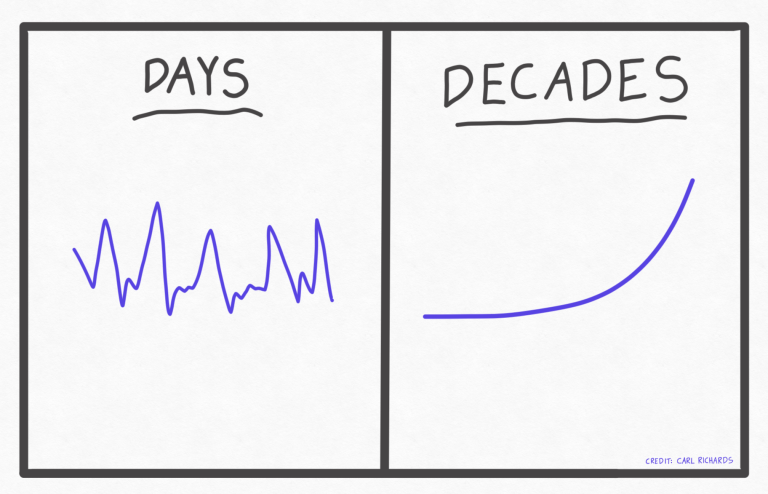The secret power of the 10-10-10 rule.
A framework for prioritizing decisions that matter.
Day traders are constantly glued to their screens. Every phone call matters. Every market dip. Days are volatile.
Conversely, Warren Buffett doesn’t even have a computer on his desk. His investment philosophy is to pick the right industries and managers and ignore the noise. Days are still volatile, but Warren’s performance over 5+ decades is smooth, up, and to the right.
When my wife and I are unsure about a decision, we use the 10-10-10 rule.
We ask:
Will it matter in 10 minutes?
Will it matter in 10 months?
Will it matter in 10 years?
Some decisions matter more, and they require more conversation.
Where are we going to dinner deserves less than where are we going to raise our children?
The most effective people focus on the long term. They run mini-experiments, collect data, and spend less energy on decisions that won’t matter in 10 minutes. They prioritize getting the big stuff right.
And when they commit, they commit.
Which is scary for most of us.
Delaying decisions and leaving our options open feels safer. Even strategic.
But too much optionality is bad.
When Peace Corps volunteers return to the US, they sometimes find themselves paralyzed in the toothpaste aisle. Whitening. Brightening. Baking soda. Extra fluoride. They leave overwhelmed and empty-handed.
Victims of decision fatigue.
Western culture over-indexes on novelty. It suffers from commitment phobia.
- David Perrel in his essay, Hugging the X-axis
If choosing a toothpaste can temporarily short out our monkey brains, choosing a career, a city, or a partner can be debilitating.
To reduce decision fatigue, Steve Jobs wore the same thing to work every day. Black turtleneck, Levis, and New Balance 992 sneakers (dad shoes). Albert Einstein was also known for owning several versions of the same gray suit so he wouldn’t waste time and brainpower deciding what to wear.
We love to hate Tinder because, on some deep level, we know too much optionality is a prison. Commitment can, counterintuitively, create more freedom.
When I proposed to Elizabeth and she agreed to marry me, I felt lighter. I spent a lifetime looking for a spouse on a planet of 7.7 billion people. After we chose each other, that decision was behind us and I had more reserves to handle everything else. The daily ups and downs.
Day-to-day challenges feel smaller and more manageable when we get the big stuff right.
We’re more indefatigable.
It’s easier to handle the days when we’re focused on decades, especially if we’re building something we care about it.
A career, a movement, a body of research.
A marriage. A family.
Doing anything meaningful starts with a long time horizon and focusing our energy on the decisions that matter.
10-10-10.
Will it matter in 10 minutes? 10 months? 10 years?

